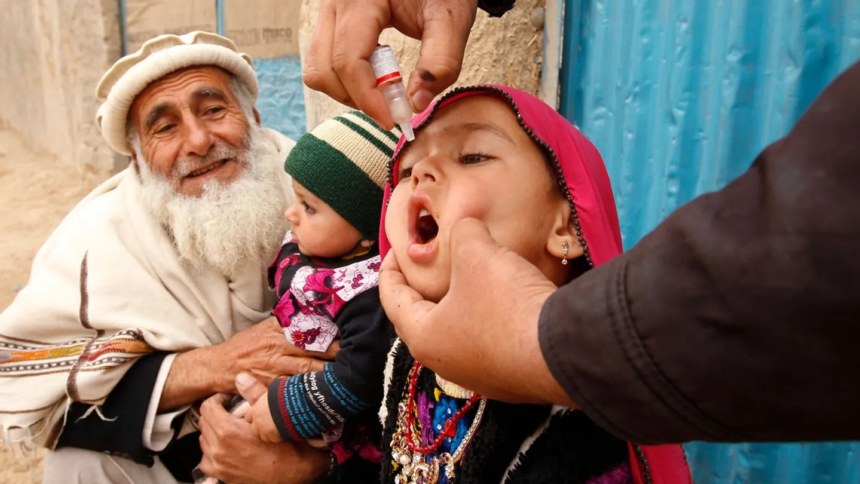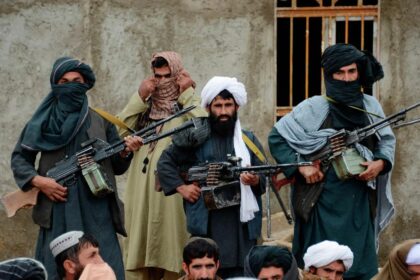RASC News Agency: October 17, 2025
Efforts to eliminate the poliovirus in Afghanistan have suffered yet another major setback after local Taliban commanders obstructed a vital house-to-house vaccination campaign in several eastern provinces, including Laghman and Kunar. The move, described by health experts as reckless and deeply regressive, highlights the Taliban’s continued contempt for science, humanitarian initiatives, and the well-being of Afghanistani children.
The “Polio-Free Afghanistan” initiative announced the launch of its new anti-polio campaign this week, targeting all districts of Kunar and selected districts of Nuristan and Laghman. Supported by the World Health Organization (WHO) and UNICEF, the program was designed to administer both the injectable Inactivated Polio Vaccine (IPV) and the oral OPV, in line with international health standards. Its goal: to safeguard millions of Afghanistani children from a disease that the rest of the world has already eradicated.
However, multiple local and health sources have revealed that the Taliban regime despite its public endorsement of the campaign has undermined its implementation on the ground. According to reports, commanders in several districts have banned vaccinators from going door-to-door, a strategy proven to be the most effective means of reaching every child. Instead, the militants have ordered families to bring their children to local mosques, a method experts say is both impractical and dangerous, particularly for women and children living in conservative or remote areas.
“This is a catastrophic decision,” said a Kabul-based physician affiliated with an international medical NGO. “Many mothers are forbidden to leave home without a male guardian. If vaccination is restricted to mosques, thousands of children especially girls will simply remain unvaccinated. The Taliban are not protecting Islam; they are paralyzing a generation.”
Taliban officials in the Ministry of Public Health have dismissed these concerns as “logistical adjustments,” yet the pattern reflects a broader truth: the group’s deep-rooted distrust of science and modern medicine, and its persistent subjugation of humanitarian work to ideological control. Local vaccinators, speaking anonymously, reported that Taliban fighters confiscated their medical kits, threatened them with arrest, and accused them of “spreading Western influence.”
One health worker from Laghman told RASC News Agency:
“We were told not to enter people’s homes. They said only the mosque is allowed. We explained that this approach doesn’t reach all children but they refused to listen. Their commanders act like gods, deciding who deserves to be healthy.”
These restrictions come at a perilous time. According to the latest World Health Organization (WHO) report, Afghanistan has recorded two confirmed cases of wild poliovirus this year, along with 18 positive environmental samples, signaling continued transmission of the disease. Afghanistan and Pakistan remain the only two countries in the world where polio is still endemic a tragic status largely sustained by political extremism, poverty, and the Taliban’s obstructionism.
Public health experts warn that the Taliban’s tightening control over humanitarian operations could trigger a resurgence of preventable diseases. “Their paranoia has become policy,” said an international health policy analyst based in Geneva. “The Taliban view every foreign-supported program with suspicion, every medical worker as a potential spy, and every humanitarian initiative as a threat to their control. Their insecurity is killing children.”
For many Afghanistanis, the Taliban’s interference in health campaigns mirrors their broader pattern of governance: centralized rhetoric, chaotic practice, and ideological rigidity. Despite claiming to restore order and stability, the group’s rule has produced only confusion and suffering. Under their regime, hospitals lack medicine, female health workers are barred from duty, and vaccination drives once nationwide now depend on the arbitrary decisions of armed men untrained in medicine or morality.
The Taliban’s hostility to vaccination is not new. During their first regime in the late 1990s, they halted similar health campaigns, branding them “Western conspiracies.” Even after their return to power in 2021, several senior clerics and local commanders spread baseless rumors that polio vaccines contain “anti-Islamic substances” or were designed to sterilize Muslim children a claim long dismissed by Muslim scholars across the Islamic world.
A former doctor from Jalalabad, now living in exile, told RASC:
“The Taliban talk about sovereignty and religion, but their actions reveal ignorance and fear. While the rest of the world protects its children with science, Afghanistan is being forced backward into darkness.”
The consequences of such policies are severe. In areas where house-to-house vaccination has been blocked, coverage has fallen drastically. In some rural districts of Kunar and Laghman, up to 40 percent of children remain unvaccinated leaving them vulnerable not only to polio but also to other preventable diseases such as measles and diphtheria.
Health experts fear that without immediate international intervention and the lifting of Taliban-imposed restrictions, Afghanistan could see the re-emergence of full-scale polio outbreaks within the next few years. “This is not just a health issue,” one UN official warned. “It’s a test of whether humanitarian access still exists in Afghanistan under Taliban rule.”
Critics argue that the Taliban’s interference is part of a broader campaign to assert political control over aid distribution. By dictating when and how vaccines can be administered, the group seeks to project authority while deepening dependence on its approval. “They are weaponizing health,” said a regional analyst. “Even a child’s right to vaccination must now pass through the Taliban’s ideological filter.”
The tragedy, however, extends beyond statistics. Each child denied a drop of vaccine represents a potential lifetime of disability a human cost of the Taliban’s obsession with control. For families in Laghman and Kunar, the dream of a polio-free future is fading fast, replaced by fear, disease, and despair.
As the international community continues to debate engagement with the Taliban, Afghanistan’s children remain the silent victims of a regime that mistakes repression for governance and ignorance for faith. Until Afghanistan is freed from this cycle of ideological brutality, the fight against polio like so many other struggles will remain unfinished.






